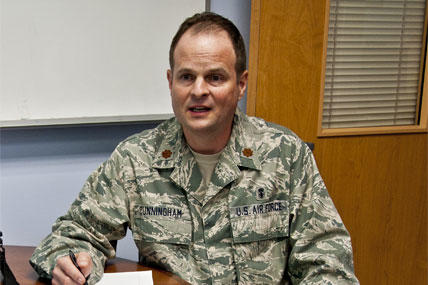MCCHORD FIELD, Wash. -- For some airmen, finding a kind ear and expertise from someone in the mental health profession can mean the difference between life and death.
Maj. Brian Cunningham, a 446th Aeromedical Staging Squadron mental health nurse, finds a sense of purpose by caring, listening and teaching mindfulness to airmen navigating life's rough patches. The 446th ASTS mental health team is providing ongoing active support to the wing through assessment and support of Airmen identified through post-deployment and annual screening with mental health concerns.
"Seeing the positive outcome is rewarding for me," said Cunningham, a reservist who is also a mental health nurse in his civilian job with the Department of Veterans Affairs in Ogden, Utah. "This career field is challenging and truly allows a greater understanding of human nature and condition through ongoing interface with patients and families."
These trained psychiatric and mental health nurse practitioners provide comprehensive psychiatric and mental health care to include psychotherapies and psychopharmacology for patients of all ages.
They are in short supply in both the private sector and in the Defense Department, and the Air Force is recruiting to fill vacancies in order to meet the needs of service members and their families, according to Lt. Col. Keith Smith, Air Force Medical Operations Agency,consultant to the Air Force Surgeon General for Psychiatric and mental health nursing.
Becoming a mental health nurse just made sense to Cunningham, who began his military career as an enlisted combat medic in the Army National Guard. He later transitioned to behavioral sciences and worked in psychiatry and neurology units.
"I really enjoyed the challenges of assessing and caring for people during very difficult periods in their life and I soon saw this care -- individually through crisis counseling, administering medication and facilitating psycho-educational groups -- made a difference," the Cunningham said. "Many patients verbalized the benefits of psychiatric in-patient care as they were discharging to home."
"The psychological impacts of war can be and are traumatic to the point of debilitation that results in a deterioration of our most important resource: our Airmen," Smith said. "Psychiatric and mental health nurses, (like Cunningham,) are on the front line of this issue and with other mental health professionals provide an important contribution to the overall preparation of personnel to learn stress management and resiliency skills that lessen, prevent or mitigate the effects of traumatic events and lifelong physical disfigurement."
Though the career field and role of the mental health providers hasn't changed much over the years, Smith said the capabilities and skills of the psychiatric and mental health nurse have become more recognized as society has removed much of the stigma associated with psychiatric disorders and treating them.
"Prevention of mental illness is a key aspect to military health due to the tremendous stressors that military missions and trauma places on individuals, units and the families that support them," Smith said. "The current operations, increased suicides, and the ability to evacuate, treat, and save the lives of severely wounded service members have brought these psychological injuries to the forefront of the military medical system."
One of the ways Cunningham brings more to the effort in advancing the career field to address these needs is by working with his civilian VA colleagues.
"Working together on a multidisciplinary team is a great experience," he said. "Constantly learning from others' unique perspectives on strategies can make a difference for patients."
Furthermore, working both for the VA and the Air Force Reserve has exponentially increased Cunningham's ability to care for his patients and enables him to quickly develop a rapport with them, he said.
"I speak the unique military language and have a shared history with my patients," the Operation Enduring Freedom veteran said. "Further, the training and experience I receive with the VA and in the Air Force Reserve overlap -- in particular with the understanding of clinical concerns such as post-traumatic stress, traumatic brain injury, suicide prevention and suicide risk assessment. Finally, my in-depth understanding of the VA system and ability to explain resources to fellow reservists is utilized on a regular basis."
It's that kind of experience, dedication and support that can make all the difference in both the career field and in patient care, Smith said.
"His leadership in this direction is a standard for others to emulate," Smith said about Cunningham. "As the Air Force and the nursing community as a whole move toward doctorate-level preparation to practice, I predict we will see more nursing research in the mental health nursing career field within the Air Force. Research is the foundation for the development and application of evidenced-based practices."
Cunningham, who was recently awarded a post-masters certificate from Saint Louis University as a psychiatric mental health nurse practitioner, is doing his part to advance the career field by continuing studies and research. He completed his board certification with the American Nurse Credentialing Center in June and recently presented his post-graduate research to the Air Force Nursing Executive Leadership Symposium in Dallas. He is also selected to present his research to the International Nurses Society on addictions in Washington, D.C., in September.
"The psychiatric mental health nurse practitioner role seems to be a growing role in the Air Force," Cunningham said. "It is sure to be rewarding to those that choose this profession."



























